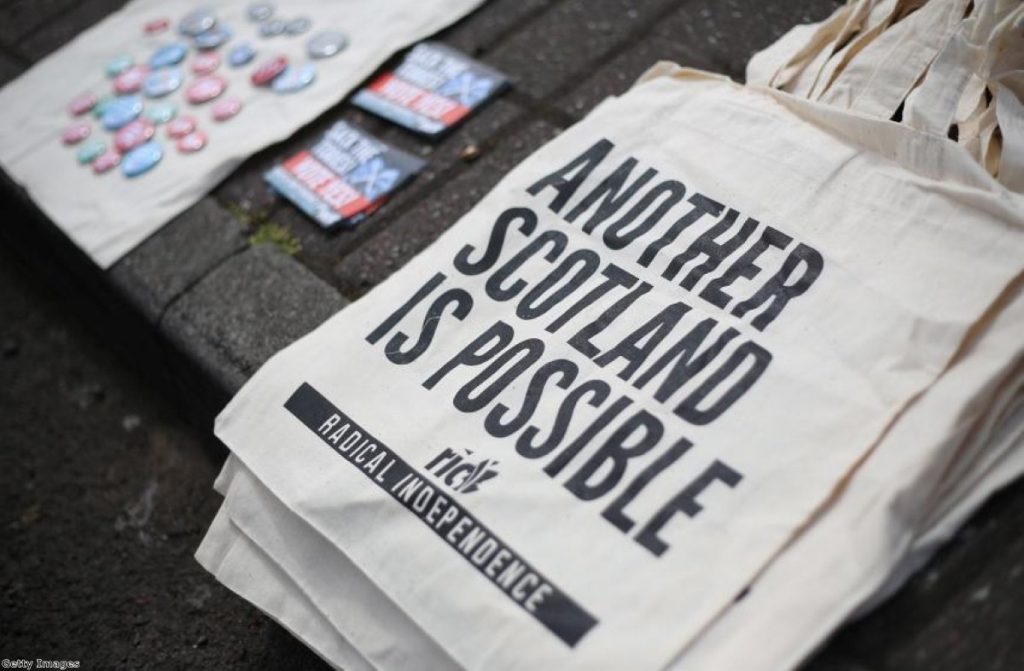How different are Scotland’s values to the rest of the UK’s?
The case against Scottish independence has a pretty clear answer to the question of whether Scotland has its own separate values system: it just doesn't exist.
Perhaps the nationalists shouldn't bother contesting Scottish secretary Alistair Carmichael's claim, for example, that "there is no more a set of homogeneous Scottish values than there is a set of homogeneous English values".
After all, of all the reasons for and against Scottish independence, most voters aren't going to be bothered by something as vague as a value system.
And yet it matters – it really matters. If the 'yes' campaign can show that the Scottish people are demonstrably different from the rest of Britain, the case for taking control of their own destiny becomes so much stronger.
It doesn't really matter about the advantages and disadvantages of this or that policy. Who cares about the pros and cons of Scottish independence when you're trying to separate yourself from people who think differently to you?
"It's not really driven by some kind of essential desire to be an independent country," SNP MP Eilidh Whiteford says. "It's about what that would enable us to do. For me, it's about having a more accountable government and a fairer society."
The Scottish government is desperately keen to make the most of 'Scottish values', although they haven't made completely clear what exactly these might be.
Part of the problem is that many of the values which Scottish people hold dear would be agreed on by people all over the world.
"My instinct is that general social values would not be very different across the UK in terms of attitudes to welfare, publicly provided healthcare, those kinds of things," says Stephen Tierney, professor of constitutional theory at the University of Edinburgh.
Class plays a big part of it, he believes. In short, it's true there might be differences between the posh middle classes of London and the south-east and those living in Scotland. But when you take into account the rest of England, it becomes far harder to work out any meaningful differences. England, it turns out, is a complicated place.

The schoolboy 'lad o' pairts' is a big part of the Scottish idea of social mobility
So is Scotland, argues Walter Humes, a visiting professor at the University of Stirling. Look at the cultural gap between east and west; deprived Glasgow and professional Edinburgh (where a quarter of children are being educated at independent schools) are thoroughly different places. There are class divisions. There is a big divide between the urban centre and large rural areas. And then there's religion, especially in the west of Scotland, where the old sectarian tensions between Protestants and Catholics prevail. "Everyone says it's not as bad as it used to be," Humes says, "but you don't need to scratch far beneath the surface to see it showing its ugly face."
Just because Scotland is a mixed-up country doesn't mean it there aren't distinctive features of its political make-up, though.
Its judges, lawyers and sheriffs are keen to assert that they run a fairer system (although they manage to notch up just as many miscarriages of justice as elsewhere).
Even before devolution, the education system differed from its English equivalent. No surprise that the Scottish feel strongly that higher education should be made available on the basis of merit and merit alone.
Then you have the Church of Scotland, which has developed very differently from the Church of England. It might even be able to claim credit for the higher levels of charitable giving seen in Scotland; rich and poor alike are happy to fork out their well-earned cash to help others. Its recent Scotland's Future project identified equality and fairness as being among its most important values.
'Fairness' risks being one of those concepts that no politician would ever declare themselves against. But in Scotland, Labour MP Ian Davidson says, there is enough "baggage" for it to mean something distinctive. From democracy in the presbyteries to the 'lad o' pairts' – the socially mobile youngster who makes his way up through society from humble beginnings – Scotland does have its own set of values.
The weakness, Davidson believes, is that Scottish people aren't very good at living up to them. "There is a distinction between how we would like to think we are and how we are," he says. "The nationalists, because they want to emphasise the difference, have tended to hark back to this 'lad o' pairts' concept of equality, democracy, and so on. The reality, as most of the opinion polls will tell us, is there's not actually that much of a substantial difference between Scotland and England."
Whiteford insists the differences are big enough to be notable. "What you can say is the way in which values are politically expressed can be quite distinctive in different parts of the world," she says. "I think it would be very hard to imagine Scottish politicians of whatever party now supporting the privatisation process of the NHS that's been going on in England." Just look at Scottish and English MPs' different voting records on a range of issues – from the Iraq invasion of 2003 to tuition fees and the bedroom tax. "That reflects a different point of coalescence around values in Scotland."
Different – but not that different. Scotland's values, it turns out, are broadly comparable to those of Liverpool, or Newcastle, or Manchester. It's only the middle-class affluence of southern England which has its own separate agenda. On that basis, it makes more sense for London to seek independence from the rest of the UK than Scotland.





-01.png)